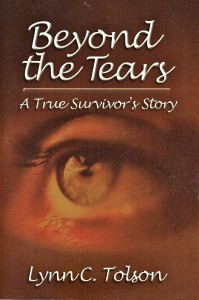Domestic Abuse and Isolation in Relationships
For Domestic Violence Awareness Month, we are featuring a number of blog posts by women writers on the topic.
Sexual assault, addiction, and suicide are unsolved social problems that carry stigmas.
The stigmas cast a code of silence that do not solve problems. The result of not speaking about the crime of sexual assault is too often tragic. There is a need for real stories of recovery. By bringing my dark secrets to light, it is my hope that others who have had similar events will know that they are not alone. Readers may explore their own emotions to open lines of communication, eliminate shame, and experience healing.
In my memoir Beyond the Tears: A True Survivor’s Story, I describe myself as a young woman who was vulnerable, easily manipulated, trained to be without an opinion, and living in the shadow of my father’s violence and subsequent suicide.
When I was 18, I met a man 18 years older than me who had threatened to kill himself if I refused to marry him. How could I deal with the responsibility of a man killing himself over me?
Not long after the marriage ceremony to my new husband, Todd, he wanted to buy land in Chandler, Arizona. He said we could get rich quickly on the land while living cheaply in a trailer. I was only twenty-one, and I objected to moving out of Tempe, away from my Arizona State University campus friends. Todd threw fits, until it seemed easier to comply with his wishes than to confront his temper. So we moved deep into the desert, past the dairy farm and the rodeo arena, where the alfalfa fields were newly zoned for mobile homes.
It was too far to commute to classes, so I withdrew. My best friends from campus, Scott and Cathy, telephoned to say they wanted to visit. I made excuses: “It’s not a good day. Todd worked later than usual last night. He’s still sleeping.” “It’s not a good time. I have to go to the doctor.” “It’s not a good year. I am very, very busy.” I was not avoiding seeing them; I was avoiding them seeing me.
A year went by. I did not return to college. I had not seen my friends. One afternoon Cathy called and insisted on visiting. Despite my excuses, they were not about to let a desert monsoon keep them away. Scott and Cathy pulled up while a dust storm was developing. As I stood outside, hollering “hello” above the noise of the rattling aluminum awning, a gust of wind literally blew me down.
“Lynn, you’re as thin as a reed!” The wind flipped my shorts like a sail, revealing the bruises on my thigh.
Scott asked, “Are you all right?”

US author Lynn C. Tolson
We made small talk while watching dust devils that looked like tiny tornadoes flitting across the terra firma. Cathy and Scott were saying goodbye. “We’re moving to Utah. We’ll write.”
As Cathy moved toward me, I stepped back, resisting her outstretched arms because my body experienced pain with an embrace. Todd had swatted me often enough that my body no longer recognized the difference between a hard hit and a warm hug. I had lost contact with my friends; I could not confide in them. There was nothing left to say.
“Lynn, you take care of yourself, okay?”
“Yeah, sure.” I was sure that another friendship was dying.
I’d already been isolated from support systems when I married him, and that made it easier for him to marry me. This dynamic enables the abuser to assert and sustain control.
The isolation may seem benign at first: An abuser may make snide remarks about her family, trying to distance her from them, but then say he was only joking. The isolation escalates when he suggests or insists that she work from home, or not at all. She loses contact with her co-workers. He may initiate arguments about her choice of religion; no faith pleases him, and he refuses to let her worship at church without him. She becomes completely dependent on him for a world view. His perspective infiltrates her perspective until her opinion of herself is diminished to reflect only his opinion; his reality becomes her reality. He lets her know she is useless, helpless, worthless, and nothing without him. She loses her self to him, her insight, intuition, and instinct vanishes. He owns her. Soon, the victim is asking, “Who am I? How did this happen?”
These are just a few of the signs of isolation to be wary of:
- She rarely goes out without her partner
- He unilaterally controls every aspect of a date
- She is restricted from seeing family and friends
- He controls who they see, when, where, and for how long
Show support for someone you suspect might be manipulated into isolation by an abuser. No amount of false romance is worth losing the authentic self. Maintain support systems in church, with friends, groups, and activities. They may save your life!
—
Follow Lynn C. Tolson on Twitter: @lynntolson; and Like her Facebook Page. She also has a blog called Beyond the Tears.
Category: Being a Writer, Contemporary Women Writers, Women Writing Memoirs, Women Writing Non-Fiction



























Lynn – it is great of you to draw attention to the aspect of isolation in abuse and share your story. Isolation is a very important part of an abusers manipulation. Much easier to control someone who has no outside support. Thank you for sharing.
Lynn – kudos for speaking up and putting the focus on the isolation, specifically how benign and unintentional the effort is made to appear by the abuser. This is a message that must get out. – Dr.LL